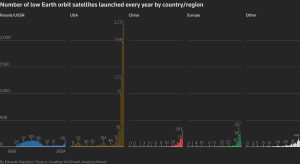Starlink Faces Competition from SpaceSail, Kuiper
Elon Musk’s Starlink satellite internet network faces increased competition, with challenges from China’s state-backed SpaceSail and Amazon founder Jeff Bezos’s Project Kuiper.
SpaceSail, based in Shanghai, signed an agreement to enter Brazil in November and started work in Kazakhstan in January, with plans to expand to over 30 countries.
Brazil is also negotiating with Project Kuiper and Canada’s Telesat for high-speed satellite internet services.

Since 2020, Starlink has launched more satellites into low-Earth orbit (LEO) than all competitors combined, providing high-speed internet for remote communities, vessels, and militaries.
Beijing views Musk’s dominance in space as a threat and is heavily investing in rivals and military research to track satellite constellations. Last year, China launched a record 263 LEO satellites.
SpaceSail aims to deploy 648 LEO satellites this year and 15,000 by 2030, forming part of China’s international push into satellite broadband.
This rapid expansion has raised concerns among Western policymakers about Beijing’s potential influence on global digital infrastructure.
Business World



Comments are closed.